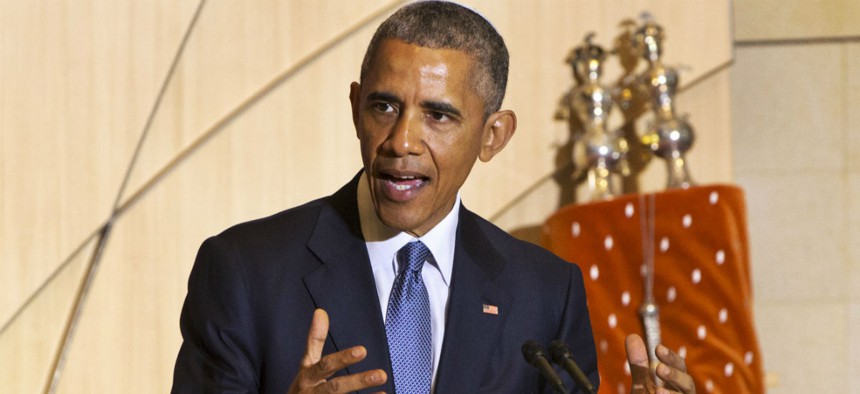Obama Delivers Strong Comeback to Netanyahu on Iran
"When I hear some people say that disagreements over policy belie a lack of support of Israel, I must object and object forcefully."
It took the White House almost three months of wandering in the diplomatic wilderness before it could find the most effective way to respond to Israeli Prime Minister Benjamin Netanyahu's extraordinary frontal assault on administration policies. But Friday, 80 days after the prime minister's confrontational speech to Congress, President Obama finally found his footing with a confident and assertive address at a Washington synagogue.
For most of those 80 days, the president was fitful in his response to Netanyahu. The one constant was that he found himself playing defense while the Israeli leader and his allies in the Republican Party were always on offense. It was, to most observers, an unusually emotional stance for a president who prides himself on his steady calm and ability to stay above emotional squabbles.
It is why the president reacted so negatively during his lengthy interview this week with Jeffrey Goldberg of The Atlantic when the writer said that his response "seemed very fraught and very emotional" with more criticism of Israel than any other American ally faced. "I have to say, Jeff, I completely disagree with that assessment," responded the president, insisting he simply had "a policy difference" with Netanyahu. But Goldberg was not alone in his conclusion and it was something Obama needed to deal with more fully than a simple denial in an interview.
Friday, wearing a yarmulke and standing in the sanctuary of the Adas Israel synagogue, Obama did just that. It was perhaps the first time since Netanyahu's March 3 appearance on Capitol Hill where he did not appear defensive. If anything, his 29-minute speech—and the warm reception it earned from the almost 1,200 in the audience—was an effort to put Netanyahu on the defensive. Obama convincingly cast himself as the one who is staying true to the ideals of the Jewish state, the one who is faithful to the founders of Israel when he pushes for fair treatment of Palestinians and serious negotiations with Iran. The values of the founders, he said movingly, "came to be my own values."
It is because of that, he said, that "when I hear some people say that disagreements over policy belie a lack of support of Israel, I must object and object forcefully." When the applause died down, he added, "For us to paper over difficult questions, particularly about the Israeli-Palestinian conflict or about settlement policy, that's not a true measure of friendship."
Obama said it is his love of Israel that impels him to challenge Netanyahu's election-eve declaration that there will be no two-state solution to that conflict. "It is precisely because I care so deeply about the state of Israel—it's precisely because, yes, I have high expectations for Israel the same way I have high expectations for the United States of America—that I feel a responsibility to speak out honestly about what I think will lead to long-term security and to the preservation of a true democracy in the Jewish homeland," he said to more applause. "And I believe that's two states for two peoples, Israel and Palestine, living side by side in peace and security."
He said that remains true no matter how troublesome the Palestinian negotiators remain, acknowledging it is "not easy" to work with them. "The Palestinians are not the easiest of partners," he said, drawing knowing laughter. "The neighborhood is dangerous. And we cannot expect Israel to take existential risks with their security so that any deal that takes place has to take into account the genuine dangers of terrorism and hostility."
On the Iran deal, he sold it in part as something very personal to him and his legacy. As he had in his Goldberg interview, he said this partially explains why he will not accept a bad deal. "This deal will have my name on it, so nobody has a bigger personal stake in making sure that it delivers on its promise. I want a good deal."
Calling himself "an honorary member of the tribe" and reminding all that he has hosted seven White House seders, he was comfortable in the setting and forceful in his condemnation of anti-Semitism. His commitment, he explained, went back to the presence of rabbis and Jewish activists in the march in Selma, Alabama, 50 years ago.
It was an effective reminder of the kinship between African-Americans and Jews in the American civil rights movement. Whether that reminder or this visit to a synagogue are effective in keeping the president off of the defensive won't be clear until there is more follow-up by the White House. But after 80 days of stumbles, it is an important start.
NEXT STORY: CIA Shuts Down Climate Research Program




